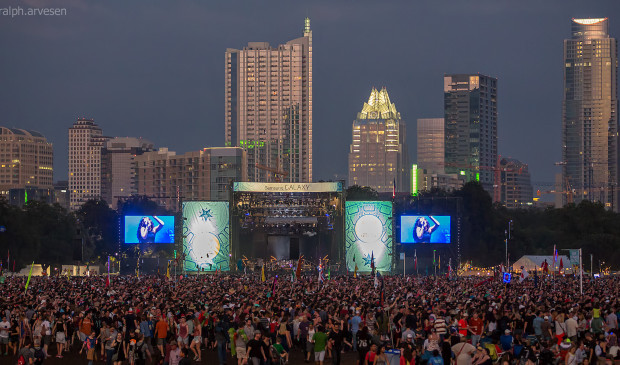Can the city save Austin’s arts and music scenes?
Friday, April 29, 2016 by
Jack Craver Scores of musicians, artists and patrons of the creative economy filled a room at the Marchesa Hall & Theatre on Tuesday to share their thoughts on how the city can better support the arts.
The occasion was a joint meeting of the Arts Commission and the Music Commission. Members of the two city panels acknowledged that they should probably work together but historically have not.
“We’re kind of like Siamese twins joined at the rear end,” quipped Arts Commissioner Bruce Willenzik. “We don’t acknowledge each other.”
The discussion focused on 72 proposed policy goals drawn up by the city’s Economic Development Department and aimed at nurturing the city’s arts and music scene in the face of rising property values and gentrification. The proposals are part of an “omnibus” initiative that a City Council resolution, approved early last month, directed staff to prepare.
Some of the proposals were specific. One called for exploring a city-run online radio station that would exclusively feature local music. Another suggested an “Austin Music Walk of Fame,” in place of the Austin Music Memorial.
Many of the others, particularly those aimed at making Austin more affordable for artists, were familiar policy ideas, only with an artistic twist. Examples include the expansion of public transit to arts hubs, development of zoning laws that encourage inclusion of arts spaces in mixed-use developments and efforts to encourage the private sector to develop a “strike fund” to finance affordable housing and artistic spaces.
Willenzik was quick to remind his colleagues that affordable housing was not a concern unique to artists and that the city was not going to be able to tailor a housing policy specifically to creative types.
“We can only create so many affordable living places or work spaces,” he said. “And how do we distribute those to artists first when everybody needs them?”
He and others emphasized the importance of arts and music businesses collaborating as a community in the hopes of maintaining a vibrant and profitable creative scene. When there’s a larger cake, reasoned Willenzik, it’s not such a big deal if your business loses a few crumbs to another one.
“Does anybody think that Austin will be cheap again and without traffic? I don’t think so. But we need to make it so that we don’t sterilize our city and lose our creatives,” he said.
Arts Commissioner Amy Mok expressed skepticism toward the city’s ability to implement all 72 of the proposals. She urged staff to refine its proposals or identify which ones could most realistically be put in place.
Music Commissioner Graham Reynolds, a composer and bandleader, said he was encouraged by the apparent support among city leaders for doing something dramatic to protect the arts.
“The city is more engaged now than it ever has been,” he said. “It’s a very exciting time and an unprecedented opportunity in my eyes.”
About a dozen people involved in the arts community came to express their hopes, as well as frustrations, about the proposals.
Singer and songwriter SaulPaul, founder of ReRoute Outreach, an arts organization aimed at underserved youth, emphasized the importance of teaching artists business skills, something that he said most workshops for artists neglect.
“I believe something that’s key is to see artists as entrepreneurs,” he said.
Clifford Gillard, a co-founder of Capitol View Arts, a nonprofit that offers educational, mentoring and networking services to artists, bemoaned the absence of the black community in the process.
“I know Austin music has a lot more black people involved,” he said. “You need to come to us, and I really believe that’s where you’re failing right now.”
Commissioners later echoed his point, emphasizing the importance of supporting a variety of musical cultures associated with different ethnic and racial groups. To that end, explained Music Commission Chair Gavin Garcia, the commission has been holding town hall meetings in every Council district, each of which highlights a different genre of music.
Neither commission took any action on staff’s proposal Tuesday, but both – along with the Economic Opportunity Commission, which will address the item on May 9 – will likely make recommendations to Council in the coming weeks. City staff is scheduled to deliver to Council a final report on the recommendations on June 3.
Photo by Ralph Arveson made available through a Creative Commons license.
You're a community leader
And we’re honored you look to us for serious, in-depth news. You know a strong community needs local and dedicated watchdog reporting. We’re here for you and that won’t change. Now will you take the powerful next step and support our nonprofit news organization?



